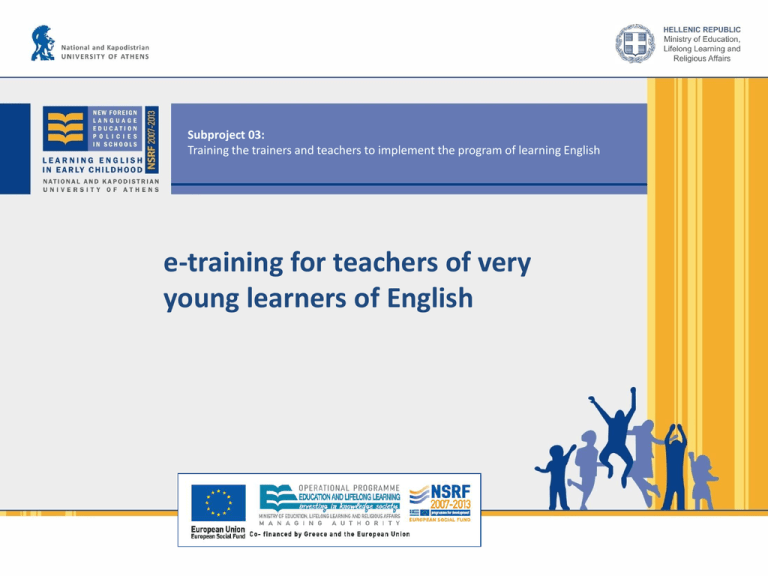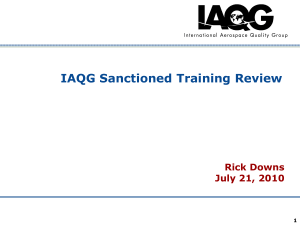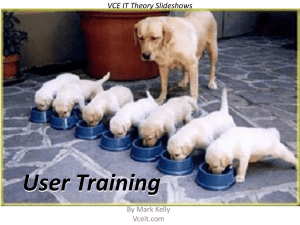e-training for teachers of very young learners of English_Β1
advertisement

Subproject 03: Training the trainers and teachers to implement the program of learning English e-training for teachers of very young learners of English e-training for teachers of very young learners A set of teacher training materials which are provided through the internet: ● a tool for the on-going training of new teachers, ● feedback and a refresher for experienced teachers who decide to teach children aged 6 - 8 years, ● a source of training materials for School Advisors and A trainers who can use the content and activities for their own teacher training seminars, ● a source of materials and examples of teaching practices for education researchers, ● a means of informing the parents of First & Second Graders (A & B) on the practices used in the teaching of English to very young learners. 2 Rationale of e-training ● to familiarize trainees with the basic principles in learning English by First and Second graders (6 - 8 years), and ● to help trainees understand the process required to develop the children’s social literacies through the foreign language so they can implement the teaching practices that are appropriate for the PEAP classes. 3 Specific objectives of e-training Educational Objectives: ● Awareness of: ● the way children think and learn, ● the way first language learning is related ● to the early development of the ● second language at school, ● the role(s) of the teacher of English, Professional Development Objectives: reflection development of digital literacy skills adaptation development of professional skills Modification of teaching practices: ● adopting practices which motivate children in the classroom and facilitate the learning of English in a natural and enjoyable manner. 4 The phases of the e-training programme 2011-2012: ● Planning and designing the training materials and their web form. ● Preparation of the 5 Thematic Modules by a team of experts in teaching English to very young learners and in teacher training. ● Digitisation of the training material and posting it on the PEAP portal. 2012-2013: ● Planning and development of three additional Thematic Modules. ● Improvement and enrichment of the e-training platform. 5 The Five Thematic Modules MODULE I 1. TEACHING YOUNG LEARNERS: INTRODUCTION 2. CLASS MANAGEMENT 3. THE TEACHER’S ROLES 3.1 The Teacher as Manager 3.2 The Teacher as Materials Developer 4. MANAGING THE SCHOOL ENVIRONMENT 4.1 The School Principal & Fellow Teachers 4.2 Managing & Communicating with Parents 4.3 A Child Talks to his/her Parents 6 The Five Thematic Modules MODULE II 1. ACTION SONGS & CHANTS The Hows and Whys of Action Songs & Chants MODULE III 1. GAMES & CRAFTS FOR CHILDREN 1.1 Individual, Pair & Group Games 1.2 Creative Crafts MODULE IV 1. THEATRE ACTIVITIES AND CLASS EVENTS 1.1 The Pedagogical Rationale 1.2 How to Organize Theatre Activities 1.3 Class Events & School Shows 7 The Five Thematic Modules MODULE V 1. STORYTELLING IN THE EFL CLASSROOM 1.1 What is a Story? 1.2 Why use stories in the classroom? 1.3 Some criteria for selecting a Storybook. 1.4 Useful Tips 2. STORYTELLING 2.1 BEFORE ACTIVITIES 2.2 WHILE ACTIVITIES 2.3 AFTER ACTIVITIES 8 The features of the e-training material ● Open access. ● Modular: evolves in Thematic Modules. ● Cohesive: each module relates to the main theme and the modules are ● ● ● ● ● interlinked in a cohesive whole. Flexible: trainees can study all Thematic Modules in a serial way or choose randomly, depending on individual needs. Interactive: trainees can register their answers (e.g., to a quiz) and receive feedback. Media rich: involves video. Multimodal: combines sound and image. Multisensory: activates multiple senses 9 How trainees can use e-training The trainees: ● can work in their own time and place, designing their individual course of study, ● are informed of the time required to complete each Module, ● can monitor their learning progress through self-assessment exercises and quizzes, ● can elaborate further through suggested references, ● are encouraged to reflect on specific examples from the classroom. 10 The role of School Advisors and A Trainers School Advisors and A Trainers can: ● inform teachers regarding the e-training material. ● encourage teachers to use it. ● use it for the planning of their own teacher training seminars. ● enrich topics, depending on developments in education and the needs of teachers. 11 Το έργο υλοποιείται από το ΚΕΝΤΡΟ ΕΡΕΥΝΑΣ ΓΙΑ ΤΗ ΔΙΔΑΣΚΑΛΙΑ ΚΑΙ ΤΗΝ ΑΞΙΟΛΟΓΗΣΗ ΤΗΣ ΓΝΩΣΗΣ ΤΗΣ ΑΓΓΛΙΚΗΣ Την ευθύνη για το περιεχόμενο αυτής της εισήγησης έχει η ομάδα εμπειρογνωμόνων του ΠΕΑΠ. Εισηγήτρια της παρούσας: Λιλίκα Κουρή Επιστημονικός Συνεργάτης http://rcel.enl.uoa.gr rcel@enl.uoa.gr





